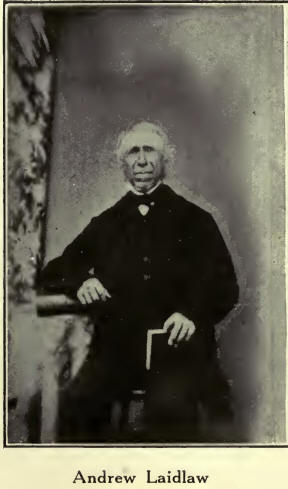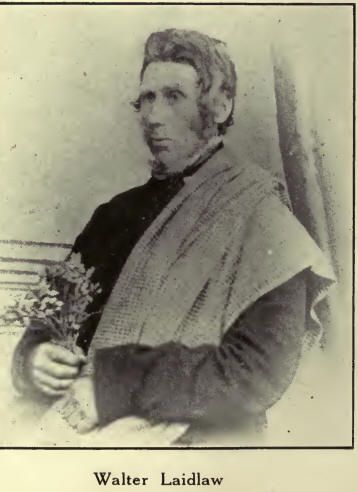|
THE first Presbyterian minister, or minister or any
denomination, who came into the Scotch Block, was The Rev. William
Jenkins from the Township of Markham. He preached on a Sabbath in June,
1820, on the farm of Andrew Laidlaw on Lot 6, in the 4th Concession of
Esquesing, and his text was Ez. 34: 25:” “And I will make with them a
covenant of peace, and will cause the evil beasts to cease out of the
land; and they shall dwell safely in the wilderness, and sleep in the
woods.” The people sat around him on logs, and his pulpit,* by the side
of which he stood, was a maple stump. He visited afterwards in the
neighborhood, baptized children, and organized the congregation. He was
born in Forfar, Scotland, in 1779, studied for the ministry, and
emigrated to the United States where he engaged in work among the Oneida
Indians for eleven years. In 1816, or 1817, he crossed over to Kingston,
and travelled westward on a missionary journey through the country to
York, in the Home District, which comprised the counties of York, Peel
and Simcoe.
The seat of government of the new Province of Upper
Canada, constituted in 1.791, was in 1794 transferred by Governor Simcoe
from Newark, at the mouth of the Niagara River, to York, the new
capital, called in honor of the second son of George III, and the
Provincial Parliament met there first in June, 1797.
For some years Mr. Jenkins was the only Presbyterian
minister in this part of Upper Canada. He organized the Church at
Richmond Hill, in 1817, and the Church in the township of Scarborough in
1818. In addition to serving these two congregations he carried on
missionary labor over an extensive territory. He owned a farm of two
hundred acres upon which he lived. He was in many ways a remarkable
man:—an excellent scholar, a ready and able preacher, remarkable for the
aptness of his texts, a faithful pastor, of a devoted missionary spirit,
of an intrepid courage, and beloved for the urbanity of his manners. He
died in 1843.
In the summer of .1821 The Rev. Abner Wright in the
Niagara district, which included the counties of Welland and Lincoln,
preached near the house of James Laidlaw, Sr., and dispensed the
Sacrament of the Lord’s Supper. On account of some informality on the
previous occasion a session was then chosen of the following men:—John
Stirrett, James Laidlaw, Robert Shortreed, George Barbour, Thomas
Barbour, George Darling, James Frazer and John Creighton. In 1823 The
Rev. Andrew Glen, a missionary from Scotland, who settled in Lower
Canada, preached and dispensed the Sacrament. In 1824 The Rev. William
King, who was ministering to a congregation on Dundas Street in the
Township of Nelson, and later on also preached at Flamborough and
Watertown, was engaged to supply the Esquesing Church with a service
every fourth Sabbath for the remainder of that year, and for part of
1825, but it is said that on account of poor health he was obliged to
desist. In 1824 The Rev. Dr. A. Bullious, of the Presbytery of
Cambridge, New York, of the Associate Church, visited Esquesing, and was
present with JMr. King at a Communion service. It would seem that the
Esquesing congregation which from the begininng had been independent,
was about this time received into the communion of the Associate Church.
What further services were rendered the Church by Mr. King are not
known, but he was present at the Communion in 1829, and was assisted by
The Rev. Andrew Bell, who was ordained pastor of the Streetsville Church
in 1828, and became well known afterwards as clerk of the United Synod,
and still later as clerk of the Synod of the Church of Scotland in
Canada. In the autumn' of 1826 The Rev. Thomas Beveridge, from the
Associate Synod of North America, visited Esquesing, and created a
division in the congregation by urging certain tenets of his
denomination and makng an unqualified assent to them necessary to
participation in the privileges of the Lord’s Supper. Many members of
the Church felt themselves excluded thereby, and strongly dissented from
the views set forth by Air. Beveridge, while others accepted them. This
was the beginning of trouble in the congregation, which was never
overcome entirely although both sides made effoffrts to do so. From time
to time occasional supplies were furnished by the Associate Synod and
the Presbytery of the Canadas, with which the Esquesing congregation
became connected. At the annual meeting in April, 1830, it was agreed by
all parties to apply to the United Secession Church in Scotland for a
minister as the most likely means to'unite the congregation. The month
of July was fixed as the time to which the congregation would wait an
answer to their petition. In the meantime The Rev. Peter Ferguson
preached to the congregation. He had come from Scotland in the autumn of
1830. In May of that year he had been ordained by the United Associate
Presbytery of Falkirk and Stirling, and on coming to Canada became a
member of the United Presbytery on April 20, 1831, and soon after was
inducted to the pastoral charge of West Gwillimbury. Mr. Ferguson was
heard in Esquesing with considerable interest and satisfaction, and
received a call, which was presented to the Presbytery of York in 1.831,
but the call was not sustained. Little encouragement being given to
continue the correspondence with Scotland, a second call to Air.
Ferguson, signed by a large majority of the congregation was forwarded
to the Presbytery of York at its meeting in Streetsville, in February,
1832, which was accepted and sustained, and on April 11, .1832, Mr.
Ferguson was inducted pastor of the First Presbyterian congregation in
Esquesing. The Rev. Duncan McMillan of Caledon preached the sermon, the
questions were put by The Rev. William King, and the charges to the
minister and people were given by The Reverend Andrew Bell.

 |
